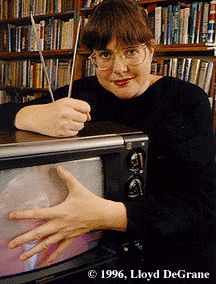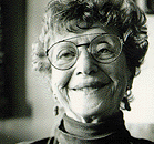
The University of Chicago Magazine
October-December 1996

Ban the Box

Until now I kept it a secret," confessed Jean Lotus in her first column as editor of The White Dot. "I own no television." A paragraph later she explained: "When our family dumped TV, our biggest fear was not missing our favorite shows. It was social ostracism. 'Eccentrics! Prudes!' Admitting you have no television is like saying you have no indoor plumbing."
Two things prompt-ed Lotus, AB'88--then a full-time mother of a 1-year-old son, now with another child on the way--to out herself: An epiphany experienced by friend Alan Sierkowski, AB'87, who dropped his set from a third-floor window when a late-night talk show got to be too much, and the hope of connecting like-minded souls also trying to raise children without the soothing narcotic of Barney and Lion King videos.
So in spring 1996 the Chicago native launched The White Dot, a 12-page, quarterly zine named after the telescoping image on an older television set that has just been turned off. The inaugural articles, many written by U of C friends, covered such topics as quitting cable, following sports without a TV, finding time to shower without being able to plunk the kids in front of the set, and determining if you're watching too much television (Question 5: "Did you actually laugh at any sitcom you watched last night?")
Lotus gave up "the plug-in drug" (in issue No. 2, she equated one viewing session to smoking "two packs of unfiltered cigarettes") in early 1992, when she married Michael Lotus, AB'85, also TV-free. Before then, although she'd never owned a TV, she'd always had roommates, their televisions, and with them, "struggles of whether or not the TV would dominate all the public space in the apartment"--one of Lotus's chief concerns about the boob tube.
Another problem for her is the 15 minutes of commercials per 60 minutes of broadcasting. And TV news, she says, is sensational, sacrificing accuracy for immediacy. But her biggest gripe is: "I think it makes human interaction unrealistic, and it develops unrealistic attitudes in people that take away from their humanity. I find that the situations on TV are very simplistic. I think that people are influenced by the stereotypes."
Not that she regards TV as unmitigated evil. Lotus admits to having once enjoyed The Simpsons, and while she prefers to maintain a "safe haven" in her home, does watch the tube at relatives' and friend's houses (see issue No. 2 for etiquette tips in these situations). Besides books, papers, and magazines, she enjoys an occasional movie and a good deal of radio, which she thinks involves more imagination and a wider variety of voices and issues.
A former newspaper reporter in Lafayette, IN, Lotus does some freelancing but considers The White Dot her main creative outlet. Each issue contains letters, a column from Lotus, an interview, news, cartoons, things to do other than watch TV, "Parents Corner," and first-person accounts of aspects of life without television. With the help of London-based David Burke, AB'86, The White Dot is going international. As its 500 subscribers might say, tune in to the message and turn off that TV. --K.S.
 Poetic Justice: Sylvia Major, PhB'34, became a poet in her 50s and started graduate school at age 69, pursuing her interest in peace, civil rights, women's rights, and ecology.
Poetic Justice: Sylvia Major, PhB'34, became a poet in her 50s and started graduate school at age 69, pursuing her interest in peace, civil rights, women's rights, and ecology.Go to:
- INVESTIGATIONS
- CHICAGO JOURNAL
- EVENTS
- LETTERS
- CHICAGOPHILE
- Feature story, "The Strange Laboratory of Dr. LaBarbera"
- Feature story, "Strength in Numbers"
- Special Report, "Building a Strong Cornerstone"
- Feature story, "The Wirszup Factor"